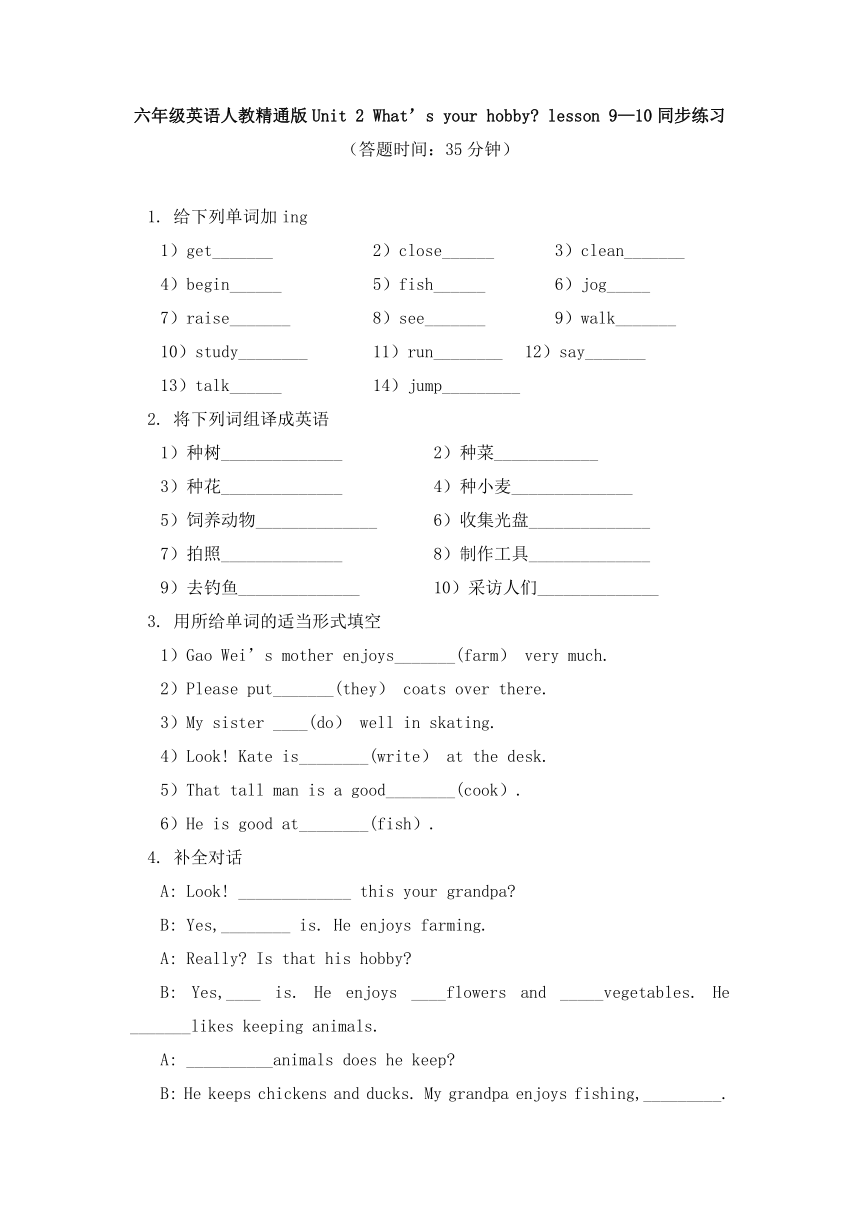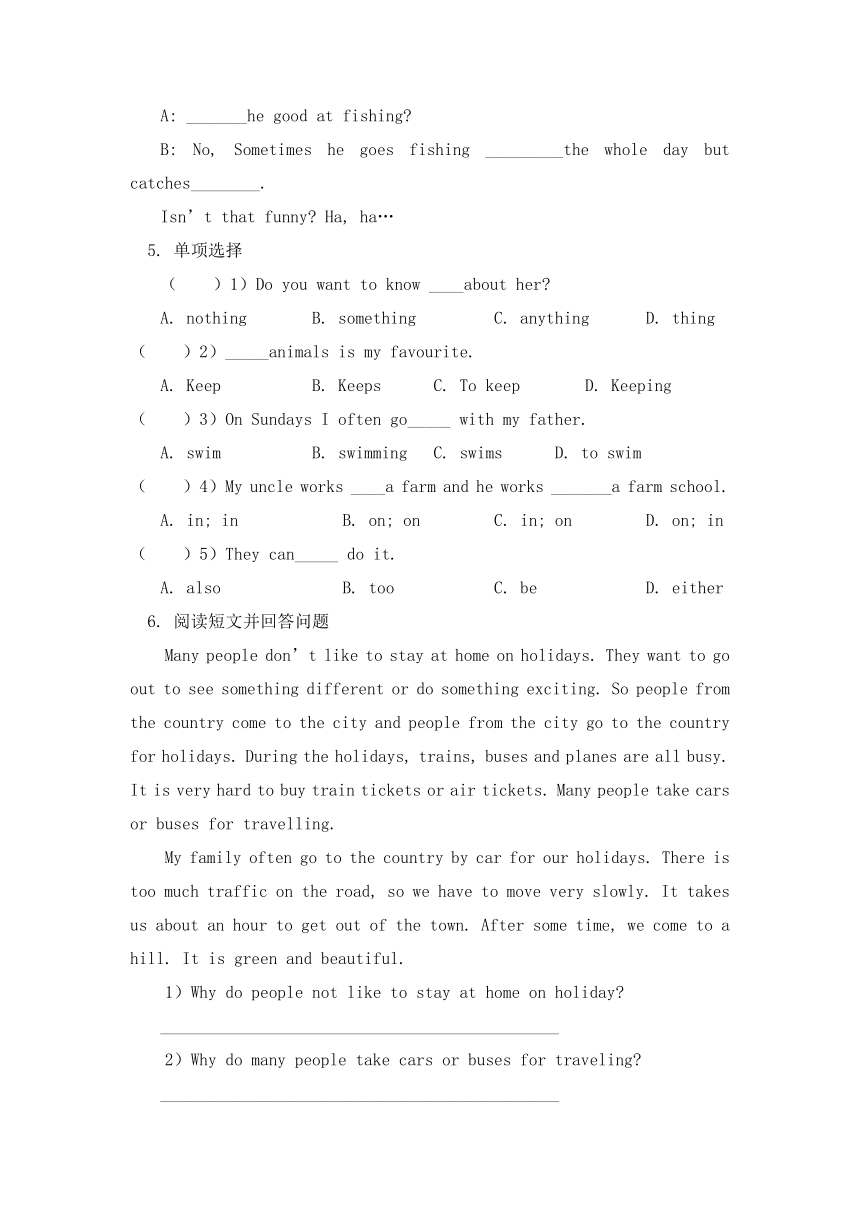Unit 2 What is your hobby Lesson 9—Lesson 10同步练习(含答案)
文档属性
| 名称 | Unit 2 What is your hobby Lesson 9—Lesson 10同步练习(含答案) |

|
|
| 格式 | doc | ||
| 文件大小 | 33.0KB | ||
| 资源类型 | 教案 | ||
| 版本资源 | 人教精通版(三年级起点) | ||
| 科目 | 英语 | ||
| 更新时间 | 2020-09-06 00:00:00 | ||
图片预览


文档简介
六年级英语人教精通版Unit 2 What’s your hobby? lesson 9—10同步练习
(答题时间:35分钟)
1. 给下列单词加ing
1)get_______ 2)close______ 3)clean_______
4)begin______ 5)fish______ 6)jog_____
7)raise_______ 8)see_______ 9)walk_______
10)study________ 11)run________ 12)say_______
13)talk______ 14)jump_________
2. 将下列词组译成英语
1)种树______________ 2)种菜____________
3)种花______________ 4)种小麦______________
5)饲养动物______________ 6)收集光盘______________
7)拍照______________ 8)制作工具______________
9)去钓鱼______________ 10)采访人们______________
3. 用所给单词的适当形式填空
1)Gao Wei’s mother enjoys_______(farm) very much.
2)Please put_______(they) coats over there.
3)My sister ____(do) well in skating.
4)Look! Kate is________(write) at the desk.
5)That tall man is a good________(cook).
6)He is good at________(fish).
4. 补全对话
A: Look! _____________ this your grandpa?
B: Yes,________ is. He enjoys farming.
A: Really? Is that his hobby?
B: Yes,____ is. He enjoys ____flowers and _____vegetables. He _______likes keeping animals.
A: __________animals does he keep?
B: He keeps chickens and ducks. My grandpa enjoys fishing,_________.
A: _______he good at fishing?
B: No, Sometimes he goes fishing _________the whole day but catches________.
Isn’t that funny? Ha, ha…
5. 单项选择
( )1)Do you want to know ____about her?
A. nothing B. something C. anything D. thing
( )2)_____animals is my favourite.
A. Keep B. Keeps C. To keep D. Keeping
( )3)On Sundays I often go_____ with my father.
A. swim B. swimming C. swims D. to swim
( )4)My uncle works ____a farm and he works _______a farm school.
A. in; in B. on; on C. in; on D. on; in
( )5)They can_____ do it.
A. also B. too C. be D. either
6. 阅读短文并回答问题
Many people don’t like to stay at home on holidays. They want to go out to see something different or do something exciting. So people from the country come to the city and people from the city go to the country for holidays. During the holidays, trains, buses and planes are all busy. It is very hard to buy train tickets or air tickets. Many people take cars or buses for travelling.
My family often go to the country by car for our holidays. There is too much traffic on the road, so we have to move very slowly. It takes us about an hour to get out of the town. After some time, we come to a hill. It is green and beautiful.
1)Why do people not like to stay at home on holiday?
______________________________________________
2)Why do many people take cars or buses for traveling?
______________________________________________
3)Why is it hard to buy train tickets or air tickets?
____________________________________________
4)Where do my family often go?
_____________________________________________
答案:
1. getting; closing; cleaning; beginning; fishing; jogging; raising; seeing; walking; studying; running; saying; talking; jumping
2. 1)plant trees; 2)grow vegetables; 3)plant flowers;
4)grow wheat; 5)keep(raise)animals; 6)collect CDs;
7)take photos; 8)make tools; 9)go fishing;
10)interview people
3. 1)farming短语:enjoy doing喜欢做……
2)their “他们的”物主代词作定语修饰后面的名词。
3)does 短语:do well in…“在……方面做得好/擅长……”。
4)writing 前面有“Look!” “看!”应该是正在进行的动作,故用进行时。
5)cooker“厨师”
6)fishing介词后用动名词。
4. Is, he, it, planting, growing, also, What, too, Is, for, nothing
5. 1)B
2)D动名词作主语
3)B go swimming固定短语“去游泳”
4)D on a farm在农场,用介词on;in a farm school在一所农场学校,用in/at
5)A also用于助动词(情态动词)/be动词后,实义动词前;too一般用于句末,与前面的句子用逗号隔开;either用于否定句。
6. 1)They want to see something different or do something exciting.
2)It is very hard to buy train tickets or air tickets.
3)During the holidays, trains, buses and planes are all busy.
4)We often get out of the town and go to a hill.
(答题时间:35分钟)
1. 给下列单词加ing
1)get_______ 2)close______ 3)clean_______
4)begin______ 5)fish______ 6)jog_____
7)raise_______ 8)see_______ 9)walk_______
10)study________ 11)run________ 12)say_______
13)talk______ 14)jump_________
2. 将下列词组译成英语
1)种树______________ 2)种菜____________
3)种花______________ 4)种小麦______________
5)饲养动物______________ 6)收集光盘______________
7)拍照______________ 8)制作工具______________
9)去钓鱼______________ 10)采访人们______________
3. 用所给单词的适当形式填空
1)Gao Wei’s mother enjoys_______(farm) very much.
2)Please put_______(they) coats over there.
3)My sister ____(do) well in skating.
4)Look! Kate is________(write) at the desk.
5)That tall man is a good________(cook).
6)He is good at________(fish).
4. 补全对话
A: Look! _____________ this your grandpa?
B: Yes,________ is. He enjoys farming.
A: Really? Is that his hobby?
B: Yes,____ is. He enjoys ____flowers and _____vegetables. He _______likes keeping animals.
A: __________animals does he keep?
B: He keeps chickens and ducks. My grandpa enjoys fishing,_________.
A: _______he good at fishing?
B: No, Sometimes he goes fishing _________the whole day but catches________.
Isn’t that funny? Ha, ha…
5. 单项选择
( )1)Do you want to know ____about her?
A. nothing B. something C. anything D. thing
( )2)_____animals is my favourite.
A. Keep B. Keeps C. To keep D. Keeping
( )3)On Sundays I often go_____ with my father.
A. swim B. swimming C. swims D. to swim
( )4)My uncle works ____a farm and he works _______a farm school.
A. in; in B. on; on C. in; on D. on; in
( )5)They can_____ do it.
A. also B. too C. be D. either
6. 阅读短文并回答问题
Many people don’t like to stay at home on holidays. They want to go out to see something different or do something exciting. So people from the country come to the city and people from the city go to the country for holidays. During the holidays, trains, buses and planes are all busy. It is very hard to buy train tickets or air tickets. Many people take cars or buses for travelling.
My family often go to the country by car for our holidays. There is too much traffic on the road, so we have to move very slowly. It takes us about an hour to get out of the town. After some time, we come to a hill. It is green and beautiful.
1)Why do people not like to stay at home on holiday?
______________________________________________
2)Why do many people take cars or buses for traveling?
______________________________________________
3)Why is it hard to buy train tickets or air tickets?
____________________________________________
4)Where do my family often go?
_____________________________________________
答案:
1. getting; closing; cleaning; beginning; fishing; jogging; raising; seeing; walking; studying; running; saying; talking; jumping
2. 1)plant trees; 2)grow vegetables; 3)plant flowers;
4)grow wheat; 5)keep(raise)animals; 6)collect CDs;
7)take photos; 8)make tools; 9)go fishing;
10)interview people
3. 1)farming短语:enjoy doing喜欢做……
2)their “他们的”物主代词作定语修饰后面的名词。
3)does 短语:do well in…“在……方面做得好/擅长……”。
4)writing 前面有“Look!” “看!”应该是正在进行的动作,故用进行时。
5)cooker“厨师”
6)fishing介词后用动名词。
4. Is, he, it, planting, growing, also, What, too, Is, for, nothing
5. 1)B
2)D动名词作主语
3)B go swimming固定短语“去游泳”
4)D on a farm在农场,用介词on;in a farm school在一所农场学校,用in/at
5)A also用于助动词(情态动词)/be动词后,实义动词前;too一般用于句末,与前面的句子用逗号隔开;either用于否定句。
6. 1)They want to see something different or do something exciting.
2)It is very hard to buy train tickets or air tickets.
3)During the holidays, trains, buses and planes are all busy.
4)We often get out of the town and go to a hill.
同课章节目录
- Unit 1 I go to school at 8:00.
- Lesson 1
- Lesson 2
- Lesson 3
- Lesson 4
- Lesson 5
- Lesson 6
- Unit 2 What's your hobby?
- Lesson 7
- Lesson 8
- Lesson 9
- Lesson 10
- Lesson 11
- Lesson 12
- Unit 3 Would you like to come to my birthday party
- Lesson 13
- Lesson 14
- Lesson 15
- Lesson 16
- Lesson 17
- Lesson 18
- Fun Time 1
- Recycle 1
- Recycle 2
- Fun Reading
- Unit 4 January is the first month.
- Lesson 19
- Lesson 20
- Lesson 21
- Lesson 22
- Lesson 23
- Lesson 24
- Unit 5 July is the seventh month.
- Lesson 25
- Lesson 26
- Lesson 27
- Lesson 28
- Lesson 29
- Lesson 30
- Unit 6 There are four seasons in a year.
- Lesson 31
- Lesson 32
- Lesson 33
- Lesson 34
- Lesson 35
- Lesson 36
- Fun Time 2
- Recycle 1
- Recycle 2
- Fun Reading
